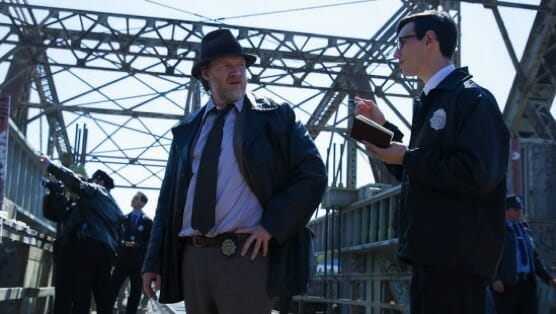Gotham: “Spirit of the Goat”
(Episode 1.06)

Gotham has made quick work of revealing its largest shortcoming in its first five episodes. The inability to create a clever, intriguing main narrative that builds tension and effectively disposes of it has plagued the show since the first hour. Each week, the writing and acting improved, but the stories remained flat. Episode six, “Spirit of the Goat” begins to swing that trend in the right direction. Kind of.
Part of the main narrative failings can be attributed to Gotham’s ironic inability to build a backstory around the week’s particular menace. In a show so focused on illustrating how classic DC villains came to be, it has, sadly, forgotten the idea for single-episode adversaries. This week was really no different, but the issue was alleviated slightly by writer Ben Edlund’s clever use of flashback. By opening the episode ten years before present day, Edlund was able to give his antagonist, and especially Bullock’s connection to him, a sense of history. Unlike in other episodes, where the failure to build an interesting villain severely hampered the plot, “Spirit of the Goat” is left relatively unscathed. Because this wasn’t a villain-of-the-week story in the vein of Gotham’s first five episodes. This was a character-driven episode. This was a Harvey Bullock episode.
What Edlund was able to do with episode six is what I had expected of the series’ second episode, “Selina Kyle,” only to be completely dumbfounded with how little that story seemed to care for its titular character. Here, Bullock is the show. It’s an approach Gotham has yet to take, and one it should chase after wildly. The show has desperately needed focus—the kind that allowed Donal Logue, giving his best performance thus far, to stand apart from the myriad of characters that roam Gotham’s streets. Fish Mooney, along with the rest of the mobsters, was blissfully absent, and the Penguin was given only a modicum of screen time. Even Gordon faded to the background. It wasn’t perfect, of course. Trade-offs came in the form of an increased role for Edward Nygma, who remains the most forced, and least subtle inclusion of any well-known Batman foe, as well as an incredibly odd encounter between Baby Bruce and Catgirl. But, for the most part, “The Spirit of the Goat” allowed Bullock to be the star, which, in turn, allowed the audience to truly learn something about the character.
The story itself was well-paced and more clever than most of what has come previously. I would declare this the best writing the show has seen, but the last few episodes have all floated so closely together in a pool of mediocrity, that it’s hard to distinguish which is better than the other. I will say that Edlund’s script had the most creative central plot of any Gotham episode, it’s only real problem being that it tipped its hand far too soon. There is nothing wrong with the audience being ahead of the characters, except for when the viewers are so far ahead that what they see for the majority of the episode is useless; they already know the answer. The saddest part is this could have been avoided with slight tweaks to dialogue or acting in an early scene. Still, what the episode came to was anything if not interesting, a stark improvement for the series.
A large problem still remains in moments of confrontation, though. Nearly every action sequence on Gotham has been bumbling and awkward, and for all “Spirit of the Goat” did to buck other bad habits, it firmly enforced this one. Every fight scene was borderline comical, and I have no idea how the trend can be reversed, other than to limit the hand-to-hand combat to an absolute minimum. Detectives do have guns for a reason, after all.
-

-

-

-

-

-

-

-

-

-

-

-

-

-

-

-

-

-

-

-

-

-

-

-

-

-

-

-

-

-

-

-

-

-

-

-

-

-

-

-








































